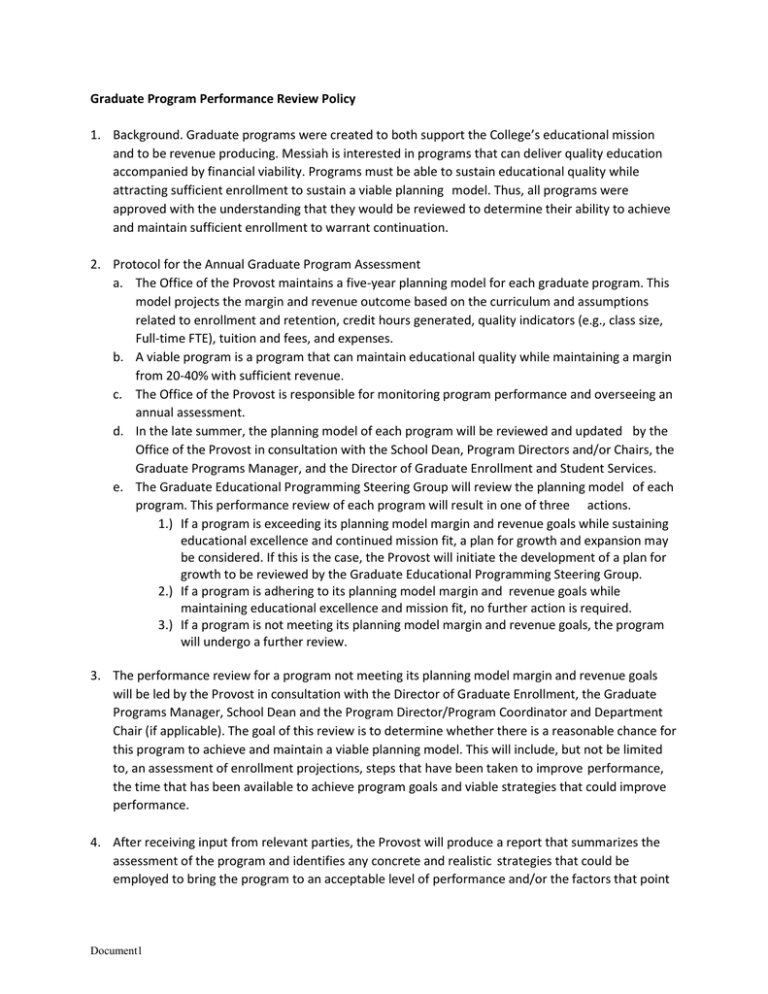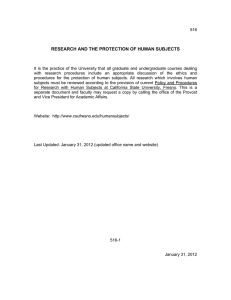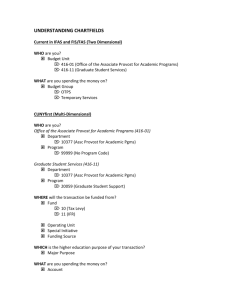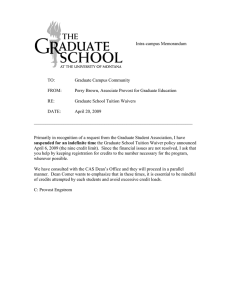Graduate Program Performance Review Policy
advertisement

Graduate Program Performance Review Policy 1. Background. Graduate programs were created to both support the College’s educational mission and to be revenue producing. Messiah is interested in programs that can deliver quality education accompanied by financial viability. Programs must be able to sustain educational quality while attracting sufficient enrollment to sustain a viable planning model. Thus, all programs were approved with the understanding that they would be reviewed to determine their ability to achieve and maintain sufficient enrollment to warrant continuation. 2. Protocol for the Annual Graduate Program Assessment a. The Office of the Provost maintains a five-year planning model for each graduate program. This model projects the margin and revenue outcome based on the curriculum and assumptions related to enrollment and retention, credit hours generated, quality indicators (e.g., class size, Full-time FTE), tuition and fees, and expenses. b. A viable program is a program that can maintain educational quality while maintaining a margin from 20-40% with sufficient revenue. c. The Office of the Provost is responsible for monitoring program performance and overseeing an annual assessment. d. In the late summer, the planning model of each program will be reviewed and updated by the Office of the Provost in consultation with the School Dean, Program Directors and/or Chairs, the Graduate Programs Manager, and the Director of Graduate Enrollment and Student Services. e. The Graduate Educational Programming Steering Group will review the planning model of each program. This performance review of each program will result in one of three actions. 1.) If a program is exceeding its planning model margin and revenue goals while sustaining educational excellence and continued mission fit, a plan for growth and expansion may be considered. If this is the case, the Provost will initiate the development of a plan for growth to be reviewed by the Graduate Educational Programming Steering Group. 2.) If a program is adhering to its planning model margin and revenue goals while maintaining educational excellence and mission fit, no further action is required. 3.) If a program is not meeting its planning model margin and revenue goals, the program will undergo a further review. 3. The performance review for a program not meeting its planning model margin and revenue goals will be led by the Provost in consultation with the Director of Graduate Enrollment, the Graduate Programs Manager, School Dean and the Program Director/Program Coordinator and Department Chair (if applicable). The goal of this review is to determine whether there is a reasonable chance for this program to achieve and maintain a viable planning model. This will include, but not be limited to, an assessment of enrollment projections, steps that have been taken to improve performance, the time that has been available to achieve program goals and viable strategies that could improve performance. 4. After receiving input from relevant parties, the Provost will produce a report that summarizes the assessment of the program and identifies any concrete and realistic strategies that could be employed to bring the program to an acceptable level of performance and/or the factors that point Document1 toward discontinuance of the program. 5. The Provost will present the report to the Graduate Educational Programming Steering Group for its review and recommendation. The Provost will take the steering group’s recommendation under advisement before issuing a final recommendation. a. If the recommendation is to continue the program with identified strategies to achieve performance goals, then the Provost will prepare a document outlining the conditions under which the program will continue, and will oversee its implementation and follow up. b. If the recommendation is to discontinue the program, the Provost will present both the recommendation and a summary of the discontinuance plan to Graduate Council, College Council, and Community of Educators Senate for action. If the discontinuance plan is approved through Messiah College’s governance, the Provost will oversee its implementation and completion. 6. Any recommendation to discontinue a program must include a plan that addresses the following: a. Current Students. A plan will be developed that establishes appropriate notification to current students of the program’s discontinuance and the date by which all program requirements must be met. The College will make provision for any student in the program to finish the program within the stated time. The plan may also accommodate current students by assisting them with a transfer to a different graduate program at Messiah College or another institution. b. Faculty. In conjunction with Human Resources, a plan will be developed in accordance with Sections 6.17.5 and 6.19 of the Community of Educators Handbook for those faculty members whose positions will be impacted if a program is discontinued. c. Staff. In conjunction with Human Resources, a plan will be developed in accordance with relevant policy for those staff members whose positions will be impacted if a program is discontinued.



